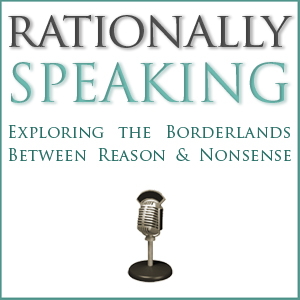Rationally Speaking #197 - Doug Hubbard on "Why people think some things can’t be quantified (and why they’re wrong)"
Rationally Speaking Podcast
New York City Skeptics
4.6 • 787 Ratings
🗓️ 13 November 2017
⏱️ 53 minutes
🧾️ Download transcript
Summary
Transcript
Click on a timestamp to play from that location
| 0:00.0 | Today's episode of Rationally Speaking is sponsored by Givewell. They're dedicated to finding outstanding charities and publishing their full analysis to help donors decide where to give. |
| 0:10.0 | They do rigorous research to quantify how much good a given charity does. For example, how many lives does it save or how much does it reduce poverty per dollar donated? You can read all about their research |
| 0:21.1 | or just check out their short list of top recommended |
| 0:23.9 | evidence-based charities to maximize the amount of good |
| 0:26.9 | that your donations can do. |
| 0:28.6 | It's free and available to everyone online. |
| 0:31.1 | Check them out at give well.org. |
| 0:33.1 | Thank you. Welcome to Rationally Speaking, the podcast where we explore the borderlands between reason and nonsense. |
| 0:53.3 | I'm your host, Julia Galef, and with me is today's |
| 0:56.6 | guest, Douglas Hubbard. Doug is a consultant and author of several books, including one of my |
| 1:02.5 | favorites, How to Measure Anything, Finding the Value of Intangibles in Business. Doug, welcome to the show. |
| 1:09.9 | Thanks for having me, Julia. So one of the reasons I think that |
| 1:15.0 | I've ended up recommending your book to many people over the years is that it's this neat hybrid |
| 1:20.9 | between being on the one hand a very practical sort of advice-driven book, and that's sort of how it's packaged. But on the other |
| 1:30.5 | hand, underlying all that advice is this idea that I think is actually very important and quite |
| 1:38.0 | deep once you get it, which is that you can measure anything. And this is an idea that is kind of counterintuitive and that, as you |
| 1:47.6 | describe in the book, a lot of people sort of instinctively resist. And one of the things I'm hoping to |
| 1:53.9 | focus on today with you is why is that? Why do we resist the idea that we can measure things and quantify our uncertainty? |
| 2:04.2 | And what are some of the ways to do that? So let's jump in. What are some examples of the kinds of |
| 2:12.0 | things that people tend to say are, oh, that's impossible to quantify, to put a number on or to measure that you would disagree. |
| 2:20.8 | Sure. Well, I can give you some real examples we've actually done. |
| 2:26.4 | You know, people are asking us to measure the value of information governance or measuring drought resilience in the Horn of Africa or the impact of |
... |
Please login to see the full transcript.
Disclaimer: The podcast and artwork embedded on this page are from New York City Skeptics, and are the property of its owner and not affiliated with or endorsed by Tapesearch.
Generated transcripts are the property of New York City Skeptics and are distributed freely under the Fair Use doctrine. Transcripts generated by Tapesearch are not guaranteed to be accurate.
Copyright © Tapesearch 2025.

